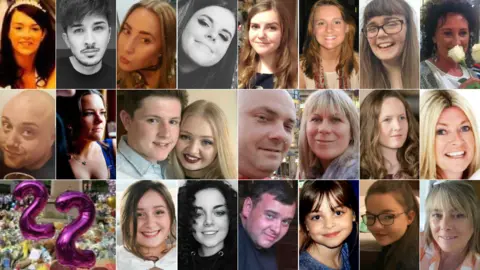Manchester Arena Inquiry: Error not to question bomber on return - MI5
 Family handouts
Family handoutsThe decision not to question the Manchester Arena bomber after he returned to the UK from Libya four days before the attack was a mistake, a senior MI5 officer has conceded.
The officer, referred to as Witness J, told the Manchester Arena Inquiry Salman Abedi was assessed in the months before the 22 May 2017 bombing.
He said "no intelligence" indicating a threat to national security was found.
But he conceded it was an error not to ask police to question Abedi on 18 May.
The inquiry has begun looking at what was known about the 22-year-old before the attack, which saw 22 people die and hundreds more suffer injuries in a bombing at the venue on 22 May 2017.
The hearing was told that from December 2013 to January 2017, Abedi was identified as being in direct contact with three "subjects of interest", one who was suspected of planning travel to Syria, one who had links to al-Qaeda and a third who had links to extremists in Libya.
Between April 2016 and April 2017, he was identified as a second-level contact with three more "subjects of interest", all with suspected links to the Islamic State terror group.
'Lack of engagement'
Witness J, appearing in court inside a bespoke wooden box and shielded from victims' families to maintain his anonymity, was asked by Paul Greaney QC, counsel to the inquiry, if increased contact with "a person of an extremist mindset" would increase "the concern [someone] might share their mindset?"
Witness J said it did not "necessarily follow" that having contact was "a cumulative risk".
"We have to make very fine judgments about whether someone meets the threshold of investigation," he said.
"A second-level contact is a contact of a contact.
"I'm not sure that... indicates a cumulative risk developing."
The inquiry was told Abedi had himself been made a "subject of interest" for five months, but his file was closed in July 2014, due to a "lack of engagement" with extremists.
Witness J was asked about two prison visits by Abedi, the second of which was in January 2017.
Mr Greaney asked him if the visits, along with the other intelligence, should have led to Abedi being designated a "subject of interest" once again.
Witness J said there was "no intelligence to indicate that the contact was related to Abedi posing a threat to national security".
"The decision to not open [an investigation] was a reasonable one," he added.
The hearing was also told that twice in the months prior to the attack, intelligence was received by MI5 about Abedi which was highly relevant to the planned attack but was assessed at the time to relate to non-terrorist criminality.
Abedi's name also hit a "priority indicator" during a separate "data-washing exercise" as falling within a small number of former subjects of interest who merited further consideration.
The hearing was also told an assessment on 1 May 2017 had concluded Abedi should be considered for further investigation and a meeting to consider that conclusion was scheduled for 31 May.
'Obvious candidate'
Witness J conceded it was a mistake not to ask police to stop and question Abedi on his return to the UK on 18 May.
The bomber immediately took a taxi to a store of explosives and set about making his final attack preparations.
Asked by Mr Greaney if it had been a missed opportunity, Witness J said stopping him "would have been the better course of action".
Inquiry chairman Sir John Saunders said MI5 had known Abedi was in contact with terrorist suspects and his father had been involved in such activities in Libya, adding that he looked like an "obvious candidate" to be involved in terrorism himself.
Witness J had earlier told the inquiry Abedi's extremist views were "likely to have been influenced by his father Ramadan Abedi".
The court has previously heard Ramadan Abedi has refused to help the inquiry and remains a suspect in the police investigation into the atrocity.
Sir John asked Witness J about why Salman Abedi had not been referred to the Prevent counter-extremism scheme when he was closed as a subject of interest in July 2014.
The witness said consideration of a Prevent referral was not "policy" at the time and that it was a "reasonable" decision not to refer Abedi.
Sir John said it was a government de-radicalisation scheme and "MI5 didn't take advantage of it".
The inquiry continues.

Why not follow BBC North West on Facebook, Twitter and Instagram? You can also send story ideas to [email protected]
